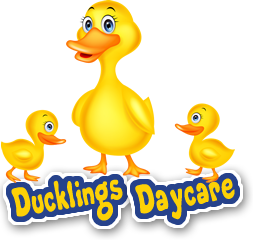Curriculum
Infants (3 weeks to 15 months)
- Language development — using books, songs and activities that match your child’s development level
- Cognitive development — using activities like peekaboo, hunt and find, and shape-sorting toys
- Motor Skill development — grasping toys, tummy time, and toys to push and pull around the room
- Sensory development — touching items with various textures and feeling materials in the sensory bin
- Rest and nap time
Toddler (16 months to 24 months)
- Encourage fine motor development. Provide your toddler with fat crayons or non-toxic, washable markers, and let him scribble on paper. This will get him interested in and give him practice drawing, coloring, and writing.
- Spend time outside. Your toddler will want to run and climb, and the outdoors is a great place for her to do this. Help her climb and play on an age appropriate playground structure. You can also engage your child outdoors by playing with a ball, or introducing her to a bicycle or riding toy that is safe and appropriate for her age and size.
- Use rhythm and rhyme. A great way to stimulate your toddler’s language development is with rhythmic rhymes. Sit with him on your knees facing you and recite simple rhymes. Don’t worry, if you don’t know any, you can make them up as you go along! You can also listen to music and hold his hands and dance.
- Toys and games. At this age, there are many things your toddler can play with. She will like blocks and toys that can be stacked. She may also like push, pull, and riding toys, such as a miniature stroller or cars and trains. You can also engage her with simple puzzles. She may also like to ‘help’ you with what you are doing; for example, if you are cooking, give her some pots and pans to play with.
- Read to your child. Reading to your child is one of the best gifts you can give him. Pick simple sturdy books with bright pictures and let him help turn the pages while you read the words on each page. Wordless books are also great at this age, and you can make up your own story.
Preschoolers (2 years to 4 years)
Children between the ages of 3 and 5 are becoming more independent and actively participating in the world around them. Preschoolers a great deal during this stage and are eager to learn and try new things.
Preschool is a time of rapid growth and development. While the preschool curriculum is designed keeping in mind the physical and intellectual developmental characteristics of 2 – 5 year old, there are certain milestones that most preschoolers should achieve before they begin kindergarten.
